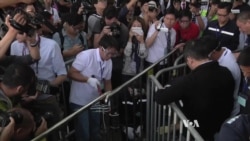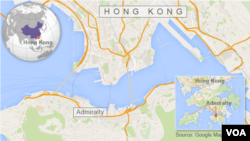Pro-democracy protesters in Hong Kong stood by peacefully Tuesday as authorities began clearing a site occupied by demonstrators since late September.
The slow but calculated effort, backed by a court order, aims to erode the area held by the demonstrators without provoking more dissent. Protesters say the effort to clear the streets could take days.
In Hong Kong’s Central business district’s Admiralty area - 30 bailiffs, backed by police, cleared a small area of a protest site near local government offices.
The barricade removal came shortly after a court injunction against blocking traffic to Citic Tower, an office building. Protesters did not resist as workers succeeded in clearing a way to the building’s parking garage.
There is also a court injunction filed by a Hong Kong taxi association and bus company to clear part of Mong Kok, another protest area which has been the site of violent clashes for several weeks.
Hours later, police used pepper spray to disperse a separate group protesting Chinese rule, after the demonstrators tried to force their way into the government's legislative council building. A tense calm was reported at and around the building early Wednesday as police boosted their presence in the district.
“The people let the bailiffs move the barricades. There have been a lot of barricades taken away, but the protesters in their tents are staying. So that is what has happened up until now," explained Pa Sha, who has been protesting in Central since the beginning of the demonstrations.
Law Yuk Kai, an observer from Hong Kong Human rights Watch, told VOA the overall situation was peaceful and smooth, and there was no confrontation.
“It is peaceful, but when explaining provisions of the injunction, bailiffs and protesters have different opinions," said Law. "It depends on how you understand it.”
What 's next?
A co-founder of the Occupy movement, Chan Kin Man, called on occupiers Tuesday to concentrate at government headquarters and the Legislative Council, saying protesters should try to reduce the interference on people's livelihoods and strive for public sentiment to prepare for a long-term democratic movement.
But several protesters from occupied areas at Admiralty say that while they respect his advice, he does not represent them.
“I think it has nothing to do with our decision upon whether to vacate or not," said a women who only wanted to be identified by her family name He.
"What he said, the referendum, is not what we want. What we want is a true universal suffrage," said a man who would only provide his family name of Ye. "What he said does not represent our opinion. We will insist to the end.”
Joseph Cheng, of Hong Kong’s Alliance for Democracy and a professor of International Relations at the University of Hong Kong, says the next steps for the protest movement are under debate.
“The protesters obviously understand that protest activities of this kind cannot go on indefinitely," he noted. "There is of course a division of views among protesters. The organizers and the majority of the protesters seem to accept that one can end the first stage and reduce to smaller area so as to reduce the inconveniences to people’s livelihood in Hong Kong.”
Protesters, who began camping out in Hong Kong after police fired tear gas and pepper spray on the demonstrators on September 28, want direct elections of the city’s leader in 2017. Beijing proposes a plan for Hong Kong’s elections that would require a panel to vet candidates for chief executive.
Last week, several protest leaders were prevented from boarding a flight to Beijing where they wanted to plead their case directly to Communist Party leaders.
The organizations supporting the Occupy movement say they will hold a meeting to discuss future actions once protesters have been cleared from the streets.
Protesters like Pa Sha expect Hong Kong authorities to continue removing barricades in the coming days.
"We expect more clearances to come through the week, maybe in the morning or at night, when the occupation is at its weakest," Pa Sha said.
Pa Sha and other demonstrators say their movement will continue until Beijing’s plan for electoral reform goes for a vote before Hong Kong’s legislature or the central government offers some form of compromise.
Public opinion poll
The removal comes as a new survey by The Chinese University of Hong Kong indicated a shift in public sentiment, with most now saying the protests should end.
Of more than 1,000 respondents, 43 percent said they were against the Occupy movement and 34 percent in favor. But 67 percent said the protesters should go home now.
This report was produced in collaboration with the VOA Mandarin service.
This report was produced in collaboration with the VOA Mandarin service.







